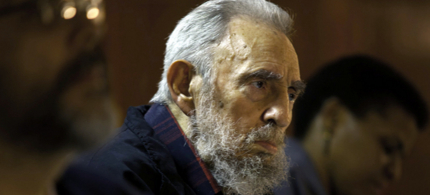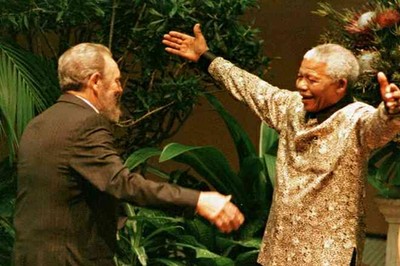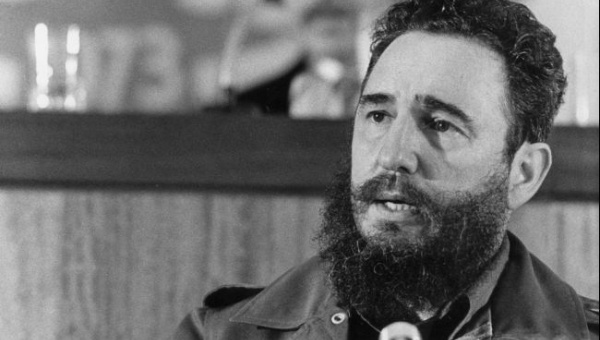50 Years of Fidel
TMS PEACE JOURNALISM, 28 Nov 2016
Introduction- 27 Nov 2016
A person who changed human history by defying the US Empire (not USA!), run from the “imperial state” New York, has left us. Yes, Cuba is not a multi-party state, the USA has had some problems recently not being one either, facing revolt inside the “parties”, Cuba will probably have the same. Yes, his regime has been ruthless at times, but nothing compared to those who changed history by creating a “New World” in the North on top of ten million indigenous people killed and massive slavery.
June 1960 I visited revolutionary Cuba to understand, knowing the US media would not be helpful. And the first reality I met was the closing of countless brothels and prostitution, not “casinos” as Washington Post writes 27 Nov 2016. And countless low class, colored women with enormous gratitude for the alternatives offered by the revolution. And high-middle class white men hating the revolution, sooner or later ending up in Miami. Very polarized.
Of course anti-imperialism was about much more than sex: the economy as trade and ownership, politics as who has the final word, military as force, like in the Bay of Pigs later. Yes, I would have preferred a Gandhi style, nonviolent revolt against imperialism, but it was in Cuban culture and their history as the revolt of black slaves against white plantation owners.
Thanks, Fidel! And thanks to all who remain truthful, fidel, to his revolution!

Fidel Castro attends a meeting with intellectuals and writers at the International Book Fair in Havana, Cuba. (photo: Roberto Chile/AP)
********************************
Editorial #1 | Johan Galtung, 3 Mar 2008
Late 1958, 50 years ago, the revolution won, Batista fled, Fidel and his brother Raúl entered Habana early 1959. The rest is history. Castro’s resignation as President is a mini-event.
He has put his mark on the history of Cuba, Latin America, the whole world. He has survived politically 10 US presidents (5 even serving more than one term, 6 also biologically), all out to intervene, invade, kill him, this Fidel, this faithful, who, hopefully, one day will write a comparative presidentology:
- Eisenhower 1957-1960
- Kennedy 1961-1963 – killed
- Johnson 1963-1964; 1964-1968
- Nixon 1969-1972; 1973-1974 – resigned
- Ford 1974-1976
- Carter 1977-1980
- Reagan 1981-1984; 1985-1988
- Bush Senior 1989-1992 (father-son, not brother-brother)
- Clinton 1993-1996; 1997-2000
- Bush Junior 2001-2004; 2005-2008 (?, the end is not known)
I met Fidel three times, mainly for interviews. He did the talking: intense charisma, rock-bottom knowledge, faith; knowing his enemy better than vice versa. He did not have Che Guevara’s charm, another, but failed, giant. What makes Castro so great?
Not only that he stood up, for 50 years, against the formidable US Empire, one of the worst in terms of exploitation, killing, arms-twisting and brain-washing in human history. He practiced an alternative, imperfect, but then nothing is.
The alternative was primacy to basic needs, the bienes fundamentales of food, clothing, housing, health, education, at a basic level, starting with the most needy, liberating them from misery. Of freedom to choose ruling party and goods, also a basic need, there was little. Of identity, another basic need, there was more when it became easier to be Catholic. Of the need to survive there was much: Cuba is not violent, unlike the USA.
US-led mafias had come far in the process of converting Cuba into a casino with brothel for US entertainment. Just to liberate those girls, mainly black, giving them education and jobs, was already something. The white Habana bourgeoisie had their pre-lunch cakes flown in from Miami. Already June 1960, traveling up and down Cuba: anyone black, woman and young was pro-Castro; most of the white, male, older Cubans were anti.
And so it stayed. The underlying conflict is not only over what the US believes and the West mimics, anti-yanqui’ism and anti-capitalism. It is also black vs white, and woman vs man.
I remember an early morning during one of my numerous visits, in 1998, when it suddenly struck me that I was the only white around. That day a Cuban black had another narrative:
Yes, Fidel and his revolution are an important episode in the history of Cuban liberation. But this has lasted centuries, basically as anti-slavery and black against white, first against Spain, José Martí, then against USA, Fidel Castro, then–He paused. The whites are in Miami. Some are still in Cuba, the Castro brothers among them. Could they have a shared interest talking less about elections? They understand, Washington not.
Fidel sacrificed some needs for others, and was punished. It would have been better had he not. I remember proposing in 1973 to members of the Politburo a two-party system, like up North, not one right and one extreme right, but two left wing, say, socialist and communist. And then debate, space, voice!
Fidel also sacrificed normal Western standard of living for the well-to-do, for today’s Millennium Goals for the masses. I suggested more freedom for small enterprises for daily comfort. The argument against both was the proven “bourgeois spirit” of elections and small business. Maybe, but then prove, do not impose, the superiority of a socialist spirit of solidarity.
The West will be harping on free elections and markets, unaware of other goals. The USA might have met these goals had it not been for criminal and stupid economic sanctions; criminal being against an overwhelming UN majority, stupid being counter-productive. General sanctions strengthen regimes, and Cuba is no exception. Consumer goods are stronger arguments against austere socialism than a hostility hitting everybody. They could have drowned socialism in macdonalds. But — eviva estupidez! — What Fidel has proved is earth-shaking: basic needs for all is possible. But there is a condition, some system change.
What happened, except sharing poverty? Four major things.
Sanctions hit economy, stifle politics, encourage military, but the culture is free to blossom, unimpeded by consumerism. First, the arts cost little and have been blossoming for artists, performers and consumers alike, to unknown heights.
Second, if you cannot process matter, process human beings instead, make education at ever higher level available for all; graduate, post-graduate, post-doctoral. The sky is the limit.
Third, a major change in foreign policy from Che’s one-two-three Vietnams to one-two-three thousand physicians with medical tools in their backpacks, helping people in the slums all over Latin America with eye operations and so on, letting Venezuela pay Cuba with oil and the others pay Venezuela?
Fourth, a new basic needs oriented economy, bypassing World Bank/IMF, in front of the closed eyes of the USA and the West trying to bring democracy to Iraq and Afghanistan by pouring water with one hand and shooting with the other.
Who will win? The faithful one, Fidel; also because he is more capable of change than the West. And there is more to come.
__________________________________
Johan Galtung, a professor of peace studies, dr hc mult, is founder of the TRANSCEND Network for Peace, Development and Environment and rector of the TRANSCEND Peace University-TPU. Prof. Galtung has published 1670 articles and book chapters, over 450 Editorials for TRANSCEND Media Service, and 167 books on peace and related issues, of which 41 have been translated into 35 languages, for a total of 135 book translations, including ‘50 Years-100 Peace and Conflict Perspectives,’ published by the TRANSCEND University Press-TUP.
This article originally appeared on Transcend Media Service (TMS) on 28 Nov 2016.
Anticopyright: Editorials and articles originated on TMS may be freely reprinted, disseminated, translated and used as background material, provided an acknowledgement and link to the source, TMS: 50 Years of Fidel, is included. Thank you.
If you enjoyed this article, please donate to TMS to join the growing list of TMS Supporters.

This work is licensed under a CC BY-NC 4.0 License.
6 Responses to “50 Years of Fidel”
Read more
Click here to go to the current weekly digest or pick another article:
TMS PEACE JOURNALISM:


Wow – well not really surprisingly, but nevertheless…. Lets look at Galtung’s claims…
“New York, has left us. Yes, Cuba is not a multi-party state, the USA has had some problems recently not being one either, facing revolt inside the “parties”, Cuba will probably have the same.”
What an amazing load of moral equivalence bulls***. Like it or not, The US *is* a multi-party state with freedom of expression. Cuba is neither.
Critics of the US can publish and discuss every aspect of US politics, policies and history in the US, travel abroad doing so, and return. Galtung himself is doing it all the time.
Critics of the Cuban dictatorship can do neither. And I see that that fact doesn’t really bother Galtung.
—
“And high-middle class white men hating the revolution, sooner or later ending up in Miami. Very polarized.”
Oh, but it is much more than that. Thousands and thousands others escaped the Cuban dictator ship. Dirt-poor people with nothing else than an inflated raft to escape on.
In in one of the singular most disgusting migration acts by a dictatorship ever, Fidel cleaned out his prisons and mentally ill and send them of to Miami to cleanse his own society.
—
“Thanks, Fidel! And thanks to all who remain truthful, fidel, to his revolution!”
Fascinating. Just as the recap of Galtung’s equally glowing and uncritical 2008 article.
Fidel’s crushing dictatorship leaves an impoverished nation and a people reduced to running around chasing dollars to buy food. A society with a level of violence that exceeds the US, with a freedom-of-press ranking in among the bottom 8 in the world. Below Belarus and Syria (!!).
Just as the old GDR dictatorship never understood – or ignored – that people might relish freedom more than just having a lot of doctors, and therefore never really understood the fissures and dynamics that crumbled their wall and their state, neither Fidel nor Galtung seem to understand – or seemed willing to understand – the people and their dreams and motivations.
The US will survive. The Cuban dictatorship will not.
Dear Mr Krogh
While I share your point that Mr Galtung seems (to eager to ) to avoid criticism of many of the authoritarian dimenions of the Cuban experiment, I think he is more focused on the yin-yang view. Of Fidel as a necessary counter weight and balance to the American “experiment”. And in that latter respect I think that Castro deserves respect and at least a measure of understanding. Not at least when you look at the other authoritarian Latin American regimes the US had no problem with.
But for the other matters I think Mr Galtung is mis- and over-reading Havana. Even the best educational and health care system in the world cannot save a nation (or state) that suffucates open dialogue and rejects (or crmininalizes) criticism. Raúl Castro has perhaps 5 years to show himself to be a Gorbachov more than a Krenz. If not the Cuban experiment will likely collapse.
It is without doubt that Fidel Castro was one of the most accomplished statesmen the past half century could ever produce.
His standing up in front of the US is an achievement which many tall leaders in the third world countries cannot even dare to. He stood up not against a country, but an unscruplous demon which has drained the world of all its peace and prosperity. This is an historic example of great proportion.
More than the above, despite his failings, his success during his life time and now alive in history, is his intergrity and firm faith in the people he lead, and his mission, and his own capabilities.
The great Fidel was a mortal. like all of us, but he will stay alive in the history of this world for a long time to come.
Dear Mr Malik
Surely your view of Castro, Cuba and the US is more nuanced than that?
Please have a look at “List of countries by Human Development Index” in Wikipedia (English). The HDI evaluates countries with special focus on the situation of the poorer classes.
– It shows that these are better off in CUBA than Turkey, Mexico, Brazil – quite successful examples of development.
– In other HDI documents you can see that CUBA has a HDI rank that is better than their economic rank (meaning wealth is used for the poor)
– Almost all Latin American / Carribean states have seen more violence by governments (+ US interventions)in the time of Fidels reign.
RIP (Requiescat in pace)
Yours
Werner T. Meyer
Dear Mr Meyer
Googling the list show Cuba at no 67. Higher than Turkey, Mexico and Brasil as you mention. But also that the Cuban position is not very impressive in the Caribbean – Bahamas, Barbados, Antigua, Trinidad being higher ranked, and if you include the non-UN members in the Caribben area, Cuba is even less impressive (most having HDIs higher than the Cuban 0.769).
Yes I agree that a poor country that ranks higher in HDI than in wealth is (obviously) spreading the wealth more broad, but is this really better than ranking higher in both counts? In the end it should be up to the people to decide the path. Democratically.